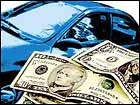
NEW YORK (CNN/Money) -
The sputtering economy has had little effect on consumer confidence as retail spending remains rock solid. But climbing unemployment rates and slow growth on Wall Street have taken an indirect toll on the nation's psyche -- making shoppers more reluctant to saddle themselves with debt.
Take car buying, for example.
Consumers are still in the market, but many these days are paying with cash. Skipping the 3- to 5-year loan, after all, helps them avoid a monthly payment, not to mention saving them thousands in interest fees. (That's especially true on used cars where loans are about 2 percent higher.)
But using cash does carry some disincentives, too.
For starters, it can jack up the price of your new set of wheels. That's because dealerships make big bucks on financing packages. If they know you plan to pay cash during the negotiating phase, they may raise their price accordingly.
"A lot of people are under the impression that they're going to get some sort of discount for paying cash," said Robert Sinclair, Jr., a spokesman for the Automobile Club of New York. "But cash can be a disincentive. Dealers may make slim margins on cars that aren't top sellers, so they want to make money on financing."
When does financing pay?
Until recently, dealers offered 0 percent financing on many models -- meaning you could pay for the car over time, sans interest, and keep your cash at the bank earning interest, rather than handing it all over in one fell swoop. Such financing deals helped set a record for new car sales in the U.S. last year, when more than 17 million new cars were sold, according to the American Automobile Association.
| 
| |
| | |
|
If you pay $10,000+ in cash for a car, it's automatically reported to the Drug Enforcement Administration. Some of our clients get so mad they pay $9,999.99 in cash, and finance the rest.
| |
| | |
| 
| |
| | |
|
Ashley Knapp
autoadvisor.com
| |
|
Zero percent deals are rare these days. But if you can find one, or anything close to it, don't pass it up. Keep your cash in an interest-bearing account such as money market accounts or Certificates of Deposit, and pay off the car over time. You'll make money on the interest and you'll have cash reserves on hand if you need them.
Sinclair said all dealerships but one, Daimler-Chrysler, have stopped offering 0 percent financing deals, but the loans you can get now are still dirt cheap. Rule of thumb: if you can make more than the rate you'll pay, don't hand over your cash.
Similarly, remember not to spend your cash on a car if it's the only money you have. If you have no savings, any unforeseen event -- a layoff or even an expensive repair to the new car -- can send you into credit card debt.
"If you want to pay cash for a car, you have to have enough cash," said Jeanne Ann Fox, director of consumer protection at the Consumer Federation of America. "Don't pay cash if it wipes out all of your liquidity."
If a refi puts you in jeopardy
Rather than draining your bank account, another option is to tap the equity in your home.
Many consumers these days are opting to purchase cars with money from a cash-out mortgage refinancing, which allows them to deduct the interest paid from their taxes, said Ashley Knapp, a researcher at autoadvisor.com.
The Fed's record 11 consecutive interest rate cuts over the past year set off a refinancing frenzy beginning in late 2001, that has yet to abate.
If you can't get rock-bottom rates on a car loan and you are sure you'll be able to make mortgage payments because you have a secure job or enough savings to get you through a pinch, cash from a refi is your best bet, said Knapp.
One word of caution, however. Don't refinance your mortgage if there's any chance you can't make your payments. You don't want to lose your home because you bought a new car.

|

